Unit 22 A world of fun要点解读
Unit 22 A world of fun reading
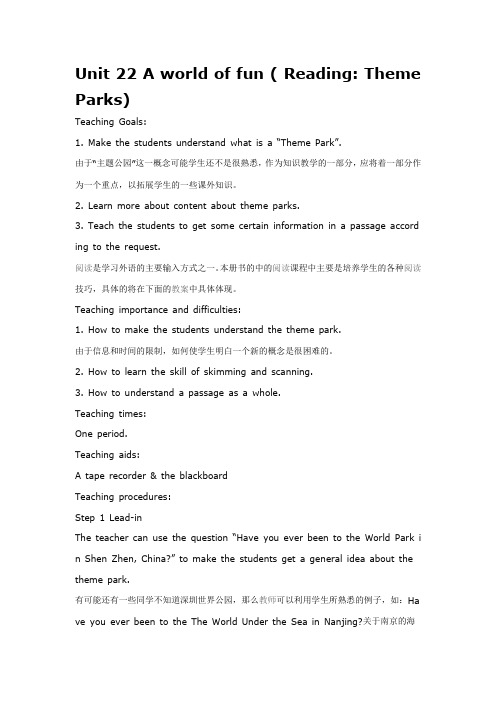
Unit 22 A world of fun ( Reading: Theme Parks)Teaching Goals:1. Make the students understand what is a “Theme Park”.由于“主题公园”这一概念可能学生还不是很熟悉,作为知识教学的一部分,应将着一部分作为一个重点,以拓展学生的一些课外知识。
2. Learn more about content about theme parks.3. Teach the students to get some certain information in a passage accord ing to the request.阅读是学习外语的主要输入方式之一。
本册书的中的阅读课程中主要是培养学生的各种阅读技巧,具体的将在下面的教案中具体体现。
Teaching importance and difficulties:1. How to make the students understand the theme park.由于信息和时间的限制,如何使学生明白一个新的概念是很困难的。
2. How to learn the skill of skimming and scanning.3. How to understand a passage as a whole.Teaching times:One period.Teaching aids:A tape recorder & the blackboardTeaching procedures:Step 1 Lead-inThe teacher can use the question “Have you ever been to the World Park i n S hen Zhen, China?” to make the students get a general idea about the theme park.有可能还有一些同学不知道深圳世界公园,那么教师可以利用学生所熟悉的例子,如:Ha ve you ever been to the The World Under the Sea in Nanjing?关于南京的海底世界,学生们可能更清楚一点。
高一英语教案:Unit22Aworldoffun
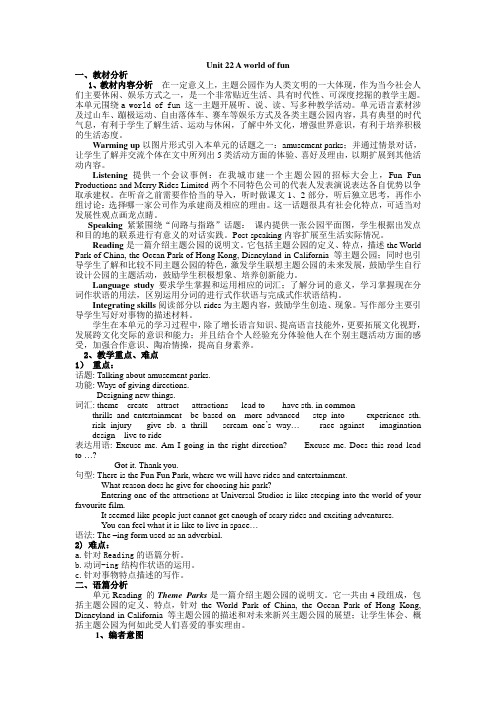
Unit 22 A world of fun一、教材分析1、教材内容分析在一定意义上,主题公园作为人类文明的一大体现,作为当今社会人们主要休闲、娱乐方式之一,是一个非常贴近生活、具有时代性、可深度挖掘的教学主题。
本单元围绕a world of fun 这一主题开展听、说、读、写多种教学活动。
单元语言素材涉及过山车、蹦极运动、自由落体车、赛车等娱乐方式及各类主题公园内容,具有典型的时代气息,有利于学生了解生活、运动与休闲,了解中外文化,增强世界意识,有利于培养积极的生活态度。
Warming up以图片形式引入本单元的话题之一:amusement parks;并通过情景对话,让学生了解并交流个体在文中所列出5类活动方面的体验、喜好及理由,以期扩展到其他活动内容。
Listening提供一个会议事例:在我城市建一个主题公园的招标大会上,Fun Fun Productions and Merry Rides Limited两个不同特色公司的代表人发表演说表达各自优势以争取承建权。
在听音之前需要作恰当的导入,听时做课文1、2部分,听后独立思考,再作小组讨论:选择哪一家公司作为承建商及相应的理由。
这一话题很具有社会化特点,可适当对发展性观点画龙点睛。
Speaking紧紧围绕“问路与指路”话题:课内提供一张公园平面图,学生根据出发点和目的地的联系进行有意义的对话实践。
Post-speaking内容扩展至生活实际情况。
Reading是一篇介绍主题公园的说明文。
它包括主题公园的定义、特点,描述the World Park of China, the Ocean Park of Hong Kong, Disneyland in California 等主题公园;同时也引导学生了解和比较不同主题公园的特色,激发学生联想主题公园的未来发展,鼓励学生自行设计公园的主题活动,鼓励学生积极想象、培养创新能力。
Language study要求学生掌握和运用相应的词汇;了解分词的意义,学习掌握现在分词作状语的用法,区别运用分词的进行式作状语与完成式作状语结构。
高中英语 词汇讲解(Unit 22 A world of fun)大纲人教版第二册
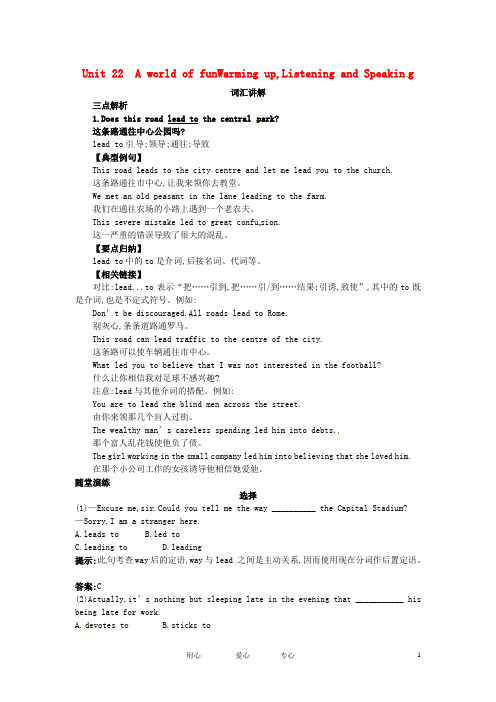
Unit 22 A world of funWarming up,Listening and Speakin g词汇讲解三点解析1.Does this road lead to the central park?这条路通往中心公园吗?lead to引导;领导;通往;导致【典型例句】This road leads to the city centre and let me lead you to the church.这条路通往市中心,让我来领你去教堂。
We met an old peasant in the lane leading to the farm.我们在通往农场的小路上遇到一个老农夫。
This severe mistake led to great confu sion.这一严重的错误导致了很大的混乱。
【要点归纳】lead to中的to是介词,后接名词、代词等。
【相关链接】对比:lead...to表示“把……引到,把……引/到……结果;引诱,致使”,其中的to既是介词,也是不定式符号。
例如:Don’t be discouraged.All roads lead to Rome.别灰心,条条道路通罗马。
This road can lead traffic to the centre of the city.这条路可以使车辆通往市中心。
What led you to believe that I was not interested in the football?什么让你相信我对足球不感兴趣?注意:lead与其他介词的搭配。
例如:You are to lead the blind men across the street.由你来领那几个盲人过街。
The wealthy man’s careless spending led him into debts.那个富人乱花钱使他负了债。
The girl working in the small company led him into believing that she loved him.在那个小公司工作的女孩诱导他相信她爱他。
高一英语Unit22Aworldoffun人教版知识精讲
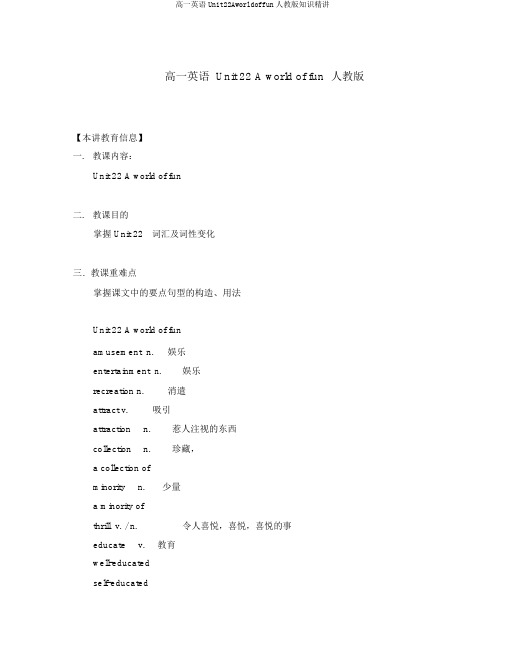
高一英语 Unit 22 A world of fun人教版【本讲教育信息】一.教课内容:Unit 22 A world of fun二.教课目的掌握 Unit 22词汇及词性变化三.教课重难点掌握课文中的要点句型的构造、用法Unit 22 A world of funamusement n.娱乐entertainment n.娱乐recreation n.消遣attract v.吸引attraction n.惹人注视的东西collection n.珍藏,a collection ofminority n.少量a minority ofthrill v. / n.令人喜悦,喜悦,喜悦的事educate v.教育well-educatedself-educatedconversation n.converse with sb.section n.部分sector n.部risk v. / n.冒做,冒injury n.the injury todo sb. an injurycarve v.切carve sth. into/out ofachievement n.成就achieve v.成就civilization n.文明civil a.民用的民事的国内的,有礼貌的civilize v.文明化的,开化的civilian a. / n.老百姓的,老百姓homesick a.恋家的seasick/airsicktwist v.扭曲,扭曲,imagination n.想象endless a.无的,没完没了的文重点:P66 READINGA theme park is a collection of rides⋯a collection of做数理解,以collection中心Unlike traditional amusement parks,⋯介做状。
⋯and culture of China’ s fifty-five minorities.minority 此少量民族,相当于ethnic groupsWhat they all have in commonis that they combine fun with the opportunity to learn something.⋯try to make sure that visitors leave knowing more about their theme.此省略 should 的虚句。
高一英语Unit 22 A world of fun人教版知识精讲
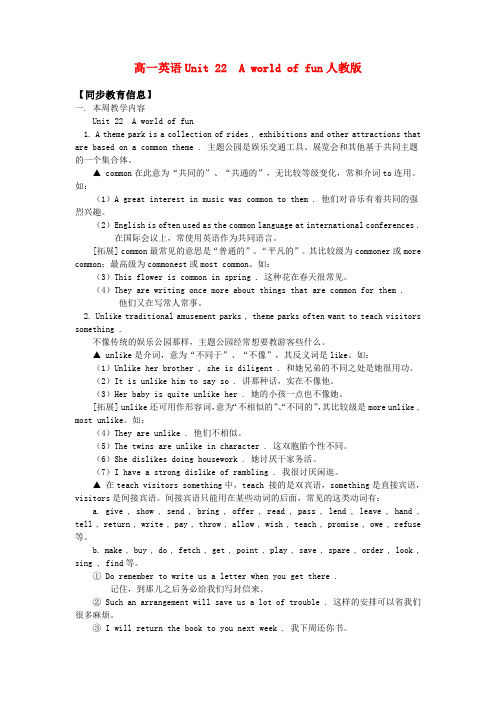
高一英语Unit 22 A world of fun人教版【同步教育信息】一. 本周教学内容Unit 22 A world of fun1. A theme park is a collection of rides , exhibitions and other attractions that are based on a common theme . 主题公园是娱乐交通工具、展览会和其他基于共同主题的一个集合体。
▲ common在此意为“共同的”、“共通的”,无比较等级变化,常和介词to连用。
如:(1)A great interest in music was common to them . 他们对音乐有着共同的强烈兴趣。
(2)English is often used as the common language at international conferences .在国际会议上,常使用英语作为共同语言。
[拓展] common最常见的意思是“普通的”、“平凡的”。
其比较级为commoner或more common;最高级为commonest或most common。
如:(3)This flower is common in spring . 这种花在春天很常见。
(4)They are writing once more about things that are common for them .他们又在写常人常事。
2. Unlike traditional amusement parks , theme parks often want to teach visitors something .不像传统的娱乐公园那样,主题公园经常想要教游客些什么。
▲ unlike是介词,意为“不同于”、“不像”,其反义词是like。
如:(1)Unlike her brother , she is diligent . 和她兄弟的不同之处是她很用功。
2011届英语总复习:unit22《aworldoffun》(大纲版第一册)
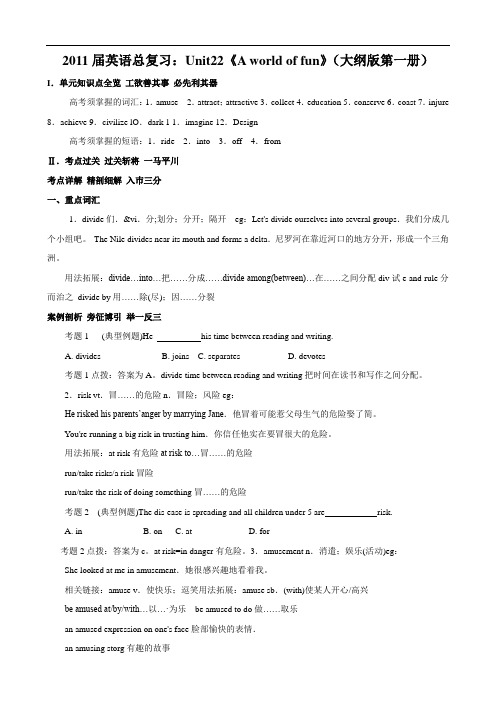
2011届英语总复习:Unit22《A world of fun》(大纲版第一册)I.单元知识点全览工欲善其事必先利其器高考须掌握的词汇:1.amuse 2.attract;attractive 3.collect 4.education 5.conserve 6.coast 7.injure 8.achieve 9.civilize lO.dark 1 1.imagine 12.Design高考须掌握的短语:1.ride 2.into 3.off 4.fromⅡ.考点过关过关斩将一马平川考点详解精剖细解入巿三分一、重点词汇1.divide们.&vi.分;划分;分开;隔开eg:Let's divide ourselves into several groups.我们分成几个小组吧。
The Nile divides near its mouth and forms a delta.尼罗河在靠近河口的地方分开,形成一个三角洲。
用法拓展:divide…into…把……分成……divide among(between)…在……之间分配div试e and rule分而治之divide by用……除(尽);因……分裂案例剖析旁征博引举一反三考题1 (典型例题)He his time between reading and writing.A. dividesB. joinsC. separatesD. devotes考题1点拨:答案为A。
divide time between reading and writing把时间在读书和写作之间分配。
2.risk vt.冒……的危险n.冒险;风险eg:He risked his parents’anger by marrying Jane.他冒着可能惹父母生气的危险娶了简。
You're running a big risk in trusting him.你信任他实在要冒很大的危险。
Unit 22 A world of fun学习指导
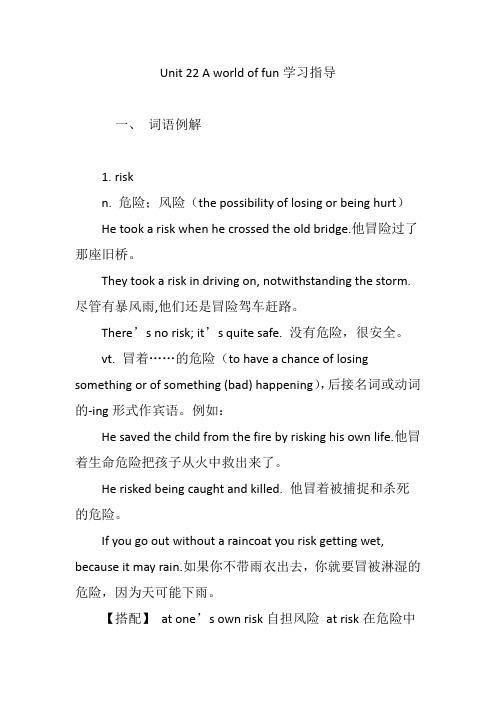
Unit 22 A world of fun学习指导一、词语例解1. riskn. 危险;风险(the possibility of losing or being hurt)He took a risk when he crossed the old bridge.他冒险过了那座旧桥。
They took a risk in driving on, notwithstanding the storm.尽管有暴风雨,他们还是冒险驾车赶路。
There’s no risk; it’s quite safe. 没有危险,很安全。
vt. 冒着……的危险(to have a chance of losing something or of something (bad) happening),后接名词或动词的-ing形式作宾语。
例如:He saved the child from the fire by risking his own life.他冒着生命危险把孩子从火中救出来了。
He risked being caught and killed. 他冒着被捕捉和杀死的危险。
If you go out without a raincoat you risk getting wet, because it may rain.如果你不带雨衣出去,你就要冒被淋湿的危险,因为天可能下雨。
【搭配】at one’s own risk自担风险at risk在危险中at the risk of 冒……危险;不顾……风险run (take)a risk (s)冒险take no risks 慎重行事take the risk (of) doing sth冒险做某事at all risks (= at any risk)表示无论如何;无论冒什么危险2. dividevt. 1) 分;划分;分开(split or break up)He divides his time between work and play.他分配他的工作和玩乐的时间。
高一英语下:Unit 22 A world of fun教案2
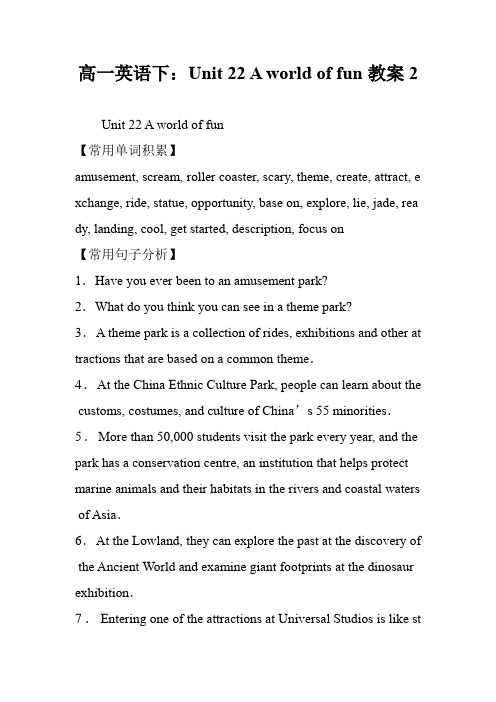
高一英语下:Unit 22 A world of fun教案2Unit 22 A world of fun【常用单词积累】amusement, scream, roller coaster, scary, theme, create, attract, e xchange, ride, statue, opportunity, base on, explore, lie, jade, rea dy, landing, cool, get started, description, focus on【常用句子分析】1.Have you ever been to an amusement park?2.What do you think you can see in a theme park?3.A theme park is a collection of rides, exhibitions and other at tractions that are based on a common theme.4.At the China Ethnic Culture Park, people can learn about the customs, costumes, and culture of China’s 55 minorities.5.More than 50,000 students visit the park every year, and the park has a conservation centre, an institution that helps protect marine animals and their habitats in the rivers and coastal waters of Asia.6.At the Lowland, they can explore the past at the discovery of the Ancient World and examine giant footprints at the dinosaur exhibition.7.Entering one of the attractions at Universal Studios is like stepping into the world of your favourite film.8.The parks are becoming more advanced and new technology allows us to experience almost anything without actually being in danger or risking injury.9.So if you want to know what it feels like to fall through the a ir, take off in a rocket, fly a helicopter, walk next to a lion, or fig ht alien creatures in outer space, visit one of the theme parks in your area.10.If you could visit one of the theme parks mentioned in the t ext, which one would you choose and why?11.Your idea should include a variety of attractions and activiti es.12.Some roller coasters even let you race against your frtends:two tracks are next to each other and you fly through the air just metres away from your friends.【单元口语交际】1.Excuse me,can you tell me where the roller coaster is? 2.Go straight down this road,then turn left at the crossing.3.Got it!4.You’re welcome!【重点难点解析】动词-ing形式用作状语.【阅读分析点拨】独立主格结构.课文理解【常用单词积累】1.amusement用作名词,意思是“娱乐”,amusement park意思是“游乐场”,美式英语中用fun fair表示.e.g.I only do it for amusement.我只不过是做着玩而已.2.scream用作动词,意思是“(因恐怖,病重等原因而)尖叫”.e.g.She screamed for help.她尖叫救命.3.roller coaster意思是“(公园中供游玩的)滑行轨道,过山车等”,如旱冰鞋可用roller skate表示.4.scary用作形容词,意思是“引起恐慌的(常用于口语中)”.e.g.Grandpa told me a scary ghost story.爷爷给我讲了一个吓人的鬼故事.5.theme用作名词,意思是“主题,题目”.文中theme park意思是“专题乐园(有专题活动的公园)”.e.g.The theme of our discussion was Europe in the 1980s’.我们讨论的题目是“八十年代的欧洲”.6.create用作及物动词,意思是“创造,创建”;形容词形式是creative,意思是“创造的,有创造力的”.e.g.God created the world.上帝创造了世界.She’s very creative;she writes and paints.她很有创造力,既从事写作又从事绘画.7.attract用作及物动词,意思是“吸引,招引”.名词形式是attraction.e.g.Her attention was attracted by his smile.她的注意力被他的微笑吸引住了.The city’s bright light,theatres,movies,etc,are great attractions.城里明亮的灯,戏院,电影等有巨大的吸引力.8.exchange用作动词,意思是“交易,交换”.e.g.John exchanged hats with Peter.约翰和彼得交换帽子.Where can I exchange my dollars for lira?我可以在哪儿把美元换成里拉?9.ride(1)用作名词,意思是“(骑马或坐车)旅游,游玩”.e.g.Shall we go for a ride in the car?我们开车去转一圈吧?(2)用作动词,意思是“骑(马或其他动物、自行车或摩托车)”.e.g.Can you ride a bicycle?你能骑自行车吗?10.statue用作名词,意思是“雕像,塑像”.e.g.This is just the statue of Liberty.这就是自由女神像.11.opportunity用作名词,意思是“机会,良机”.e.g.at/on the first opportunity...一有机会(就……)have no (little,not much) opportunity for doing (to do)sth.没有(很少有,有不多的)机会做某事[辨析] opportunity,chance当表示有机会做某事时,这两个词的用法相同,后面可接to do或of doing.chance后面可接从句,opportunity则不能.opportunity强调机会是很恰当的,chance强调偶然性.e.g.I had no chance/opportunity of visiting Beijing.我没有机会去参观北京.There is a chance that he will succeed.他有可能成功.12.base on意思是“以某事物为另一事物的根据,证据等”.e.g.I base my hope on the good news we had yesterday.我把希望寄托在我们昨天得到的好消息上.13.explore用作动词,意思是“探索,探查,探险”.e.g.We must explore all the possibilities.我们必须探索所有的可能性.14.lie用作不及物动词,意思是“位于,在……位置”.是一个不规则动词,一般过去式是lay,过去分词是lain.[辨析] lie in,lie on,lie tolie in指“位于一个范围之内”.lie on指“与……相邻,紧挨着”.lie to指“不接壤,隔……相望”.e.g.China lies in the east of Asia.中国位于亚洲东部.India lies on the southwest of China.印度位于中国西南部.Japan lies to the east of China.日本在中国以东.15.jade用作名词,在文中意思是“玉,翡翠”.e.g.I have a pretty jade vase.我有一个精致的翡翠花瓶.16.ready用作形容词,意思是“有准备的,做好准备的”,也常用作“甘心的,情愿的”意思.e.g.Be ready to start!准备出发!Are you ready for the journey?你准备好去旅行吗?I’m always ready to accept your offer.我什么时候都乐意接受你的建议.17.landing用作名词,意思是“上岸,登陆,着陆,降落”.反义词是“起飞”,即take off.e.g.This is a successful landing.这是一次成功地降落.18.cool在文中用作形容词,美国俚语中为“令人愉快的,棒的”之意.如:cool name很酷的名字(表示“时尚,特别”).e.g.Her guy is real cool.她的男朋友真帅.19.get started(1)意思是“使……开始”,get+过去分词,构成被动式,着重于动作,意为“被,受”.e.g.get slapped挨打get dismissed被开除get hurt受伤(2)get+名(代)词+宾语补语,(宾语补语可用形容词、副词、不定式、过去分词等).e.g.Tom got his feet wet.汤姆把脚弄湿了.Your can’t get your luggage in.你不能把包裹带进来.I call not get him to confess.我不能说服他坦白出来.I must get my hair cut.我的头发要剪了.20.description用作名词,意思是“描写,描绘,说明书”等,动词形式是describe.e.g.give a description of...描述一下beyond description难以形容Words can not describe my joy.言语不能形容我的快乐.21.focus on意思是“集中(于某事物)”.focus one’s attention/thoughts on sth.集中注意力(思想)于某事e.g.I’m so tired that I can’t focus on anything today.今天我太忙了,精神集中不起来了.Please focus your minds on the following problems.请集中考虑以下问题.【常用句子分析】1.Have you ever been to an amusement park?你曾经去过游乐场吗?[辨析] have been to,have gone tohave been to表示曾经去过某地,陈述一种经历.have gone to表示去了某地,目前不在此地.e.g.They have gone to England.他们到英国去了.(目前不在此地,目前正在去英国的路上,或已在英国.)They had been to England.他们曾经去过英国.(人不在英国,只表一种经历.) 2.What do you think you can see in a theme park?你认为在主题乐园你能看到什么呢?英语的疑问句通常有四种,即一般疑问句、特殊疑问句、反意疑问句和选择疑问句.但还有一种特殊形式,如What do you think I should do?这一句型,就被称为混合疑问句.这种疑问句由两个疑问句组成,句型为:疑问词+do you think+其他(正常语序).常用于这种结构的动词有think,guess(猜),suggest(建议),suppose(认为),hope,say,believe等.e.g.What do you think has happened to him?你认为他出了什么事?How many people did you say were present at the meeting?你说有多少人出席了会议?此类句型常用来征询对方对某一疑问点的判断、认识、看法、猜测等,或者请求对方重复一遍.e.g.How old did you say you were?你刚才说你多大了?(多少岁)What did you say was the matter with him?你说他怎么啦?注意:不能说What did you say the matter was with him?在口语中,可以把do you think一类的插入语放在句末带有补叙的性质.e.g.When the meeting will be held,do you think?会议什么时候举行你说呢?这种表示看法的插入语:I think,I guess等也常用在陈述句中.New York,I think,is too noisy.纽约,我认为太吵了.I think New York is too noisy.我认为纽约太吵了.插入语在句首,则变成了主句,后面接宾语从句.e.g.Who did it,do you think?Who do you think did it?你认为是谁干的?3. A theme park is a collection of rides,exhibitions and other attractions that are based on a common the me.主题公园就是围绕着某一个主题所设计的集乘车、展览及其他游乐项目为一体的公园.这是一个主从复合句,that引导的定语从句来修饰先行词,先行词由a collection...attractions短语充当.4.At the China Ethnic Culture Park,people can learn about the customs,costumes,and culture of China’s fifty-five Chinese minorities.在中国民族文化村,人们能了解中国55个少数民族的风俗,服装和文化.(1)ethnic用作形容词,意思是“民族的,种族的”.e.g.Jack opened an ethnic restaurant.杰克开了一家具有民族风味的饭店.(2)costume用作名词,意思是“(某个时代、国家或职业穿的)服装,戏装”.I found some actors in strange costume.我发现一些穿着奇怪服装的演员.[辨析] clothes,clothing,dress,suit①clothes是常用词,统指身上的各种服装,包括上衣、裤子、内衣等;是复数名词,不能直接与数词连用,后面要接动词复数形式.②clothing是物质名词,是服装的总称,除衣裤外还包括帽子、鞋袜等,没有复数形式,后面要接动词单数,“一件衣服”,要说an article of clothing.③dress范围较窄,作可数名词时指一件女服、连衣裙,作不可数名词时,指某种特殊服装,尤指在社交场合穿的衣服.④suit指“一套衣服”.e.g.She often wears beautiful clothes.她经常穿漂亮的衣服.This shop sells women’s clothing.这家商店出售妇女服装.My sister is wearing a red dress.我妹妹穿一件红色连衣裙.He had to wear evening dress to go to the company party.他要穿晚礼服去赴公司的晚宴.a sports suit运动服(3)minority用作名词,意思是“少数民族”,还可作“少数人”的意思.e.g.the rights of ethnic minorities少数民族的权利Only a minority of British households do not have a car.英国只有少数家庭没有汽车.(4)learn,learn of/aboutlearn意思是“学习,学会”,learn of/about意思是“听说,获悉”.e.g.Live and learn.活到老,学到老.It’s never too late to learn.学习不嫌晚.How Joan’s father learned about her secret marriage is a secret.琼的父亲是怎样得知她秘密婚姻的是一个谜.5.More than 50,000 students visit the park every year,and the park has a conservation centre,an institution that helps protect marine animals and their habitats in the rivers and coastal waters of Asia.每年有5万多学生参观海洋公园,公园里有自然保护中心,它是一个保护机构,帮助保护亚洲的河流和沿海水域的海产动物和它们的栖息地.(1)marine用作形容词,意思是“海的,海产的”.也可用作名词,意思是“海军陆战队士兵”.e.g.He is a marine biologist.他是一位海洋生物学家.The marines are very brave.海军很勇敢.(2)habitat用作名词,意思是“栖息地”.e.g.The creature’s habitat is the jungle.这种动物的栖息地是丛林.6.At the Lowland,they can explore the past at the discovery of the Ancient World a nd examine giant footprints at the dinosaur exhibition.在低地,人们能够在“远古世界的发现”里探索过去,在恐龙展览厅里研究恐龙巨大的脚印.(1)explore the past意思是“探索过去”.past在句中用作名词,意思是“过去,昔日”,如in the past在过去.用作形容词,意思是“过去的”,如the past year去年.用作介词,意思是“过”,如ten past eleven 11点过10分.pass用作动词,意思是“走过,经过,度过,通过”等,过去式是passed,过去分词是passed或past.e.g.Please let me pass.请让我走过去.A week passed quickly.一个星期很快过去了.(2)ancient用作形容词,意思是“古代的,古老的”(常用来指古老的文明或其产品).e.g.ancient civilizations古代的文明(3)giant用作形容词,意思是“巨大的”.e.g.What a giant panda!多大的熊猫!7.Entering one of the attractions at Universal Studios is like st epping into the world of your favourite film.踏入了环球电影公司摄影棚就像踏入了人们特别喜爱的电影世界.(1)Entering...studio动词-ing分词短语在句中作主语,谓语动词用单数.e.g.Reading newspapers is a good way of getting information.读报是一条获得信息的好途径.(2)1ike用作介词,意思是“如同,像,跟……一样”,在句中用作表语.He was like a son to me.他对我来讲就像亲儿子一样.8.The parks are becoming more advanced and new technology allows US to experience almost anything without actually being in danger or risking injury.这些乐园变得越来越先进,新的科技允许我们经历几乎任何事情,而不必实际上处于危险之中或冒着受伤的危险.allow用作动词,意思是“允许”.后面可接动词-ing形式,宾语+宾语补语(allow sb.to do sth.)e.g.They do not allow smoking here.他们不允许在这里吸烟.They allow her to so to the party.他们允许她参加聚会.9.So if you want to know what it feels like to fall through the a ir,take off in a rocket,fly a helicopter,walk next to a lion,or fight alien creatures in outer space,visit one of the theme parks in your area.因此,如果你想要知道那是什么样的感觉,比如说从空中摔下,坐在火箭里起飞,驾驶直升飞机,伴着狮子行走,或者同生活在太空里的怪物打斗,那就参观你当地的主题乐园吧! What it feels充当动词know的宾语,like用作介词,意思是“例如,比方”,相当于for example.文中的like引导的介词短语,在句中作状语,表示“举例说明”.e.g.We could look at some modern poets,like Eliot and Hughes.我们可以考虑一下现代诗人,例如艾略特和休斯.10.If you could visit one of the theme parks mentioned in the t ext,which one would you choose and why?如果你能够参观文中提到的主题乐园之一,你会选择哪一个?为什么?mentioned是过去分词充当后置定语修饰theme parks,作定语用的过去分词如果是单词,一般放在修饰的词的前面.如果是过去分词短语作定语时,则放在被修饰的词的后面.e.g.The girl dressed in white is Mary.穿白衣服的小姑娘是玛丽.There are many fallen leaves on the ground.地上有许多落叶.11.Your idea should include a variety of attractions and activiti es.你的主意应该包括各种各样的吸引人的事物和活动.[辨析] include,included,including①include用作及物动词,意思是“包括,包含”.②included用作形容词,用在名词或代词后,意思是“包括在内”.③including用作介词,意思是“包括在内”.e.g.Your duties will include putting the children to bed.你的职责包括让孩子们上床睡觉.Everyone laughed,me included.每个人都笑了,包括我在内.Ten members were present at the meeting,including myself.10个人出席了会议包括我自己.12.Some roller coasters even let you race against your friends:two tracks are next to each other and you fly through the air justmetres away from your friends.有一些过山车甚至让你同你的朋友比赛,两条轨道靠得很近,当你从空中飞越时同你的朋友只有几米之遥.Face用作动词,意思是“竞赛”,race against意思是“同……比赛”.e.g.race one’s bicycle against a car骑自行车跟汽车赛跑【单元口语交际】1.Excuse me,can you tell me where the roller coaster is?劳驾,请问到滑行轨道的路怎么走?在口语中,Excuse me的使用场合,常用于要走开、插话、问路或表示异议等场合,I’m sorry表示自己有过失,用于道歉.e.g.Excuse me,just a minute.对不起,请等一下.Excuse me for interrupting you.请原谅,打扰你(们)了.Excuse me,but can I go out for a minute?对不起,我能出去一下吗?I’m sorry to have troubled you.对不起,给你添麻烦了.2.Go straight down this road,then turn left at the crossing.沿着这条路直走,然后在十字路口处向左拐.口语中,回答问路,或告诉别人路线的常用句型.e.g.Walk along this street till you see the big gate.沿着这条街一直走到你看到大门为止.3.Got it!知道了,明白了.在口语中,常表示“学会,懂得”.e.g.I don’t get you(your ideas).我不明白你的话(你的意思).Get it?懂不懂?4.You’re welcome!别客气,不用谢!在口语中,表示回答别人对你的致谢语,常用的短语如下:Not at all.Oh,no,don’t mention it!Oh,no,the pleasure is mine.Oh,never mind it,you are quite welcome.That’s all right.Think nothing of it.Oh,no,my pleasure.【重点难点解析】动词-ing形式用作状语动词-ing形式短语可作状语,表示原因、时间、方式、伴随情况、结果或条件等多种意义.1.相当于原因状语从句.Being ill(=As she was ill),she didn’t go to school today.今天她生病了,所以没来上学.如果动词-ing形式表示的动作在谓语所表示的动作之前发生,就需要用完成形式.e.g.Not having received(=As I had not received) an answer,I wrote to him again.因为没有接到回信,我又给他写了信.2.相当于when等引导的从句.Hearing the good news (when he heard the good news),he jumped with joy.听到这个好消息,他高兴得跑了起来.如果动词-ing短语表示的动作与谓语表示的动作同时发生,常在短语前加上when或while.e.g.Be careful when crossing the street.过街时当心.When going to school,I met Mary.上学时我遇见了玛丽.如果动词-ing表示的动作完成后,谓语表示的动作才发生,此时分词用完成形式.e.g.Having finished his work(=After he finished his work),Henry went home.亨利做完工作后就回家了.3.表示行为方式、伴随情况或补充说明等.e.g.Laughing and talking,they went into the room.他们又说又笑地走进房间.4.表示结果.e.g.Her mother died in 1969,leaving her with four younger brothers and sisters.1969年她母亲死了,给她丢下4个弟妹.5.表示条件.e.g.Turning to the right(= If you turn to the right),you will find the place you want.往右转,你就会找到你要找的地方了.6.表让步状语.e.g.Knowing all this,they still insisted on my paying for the damage.虽然知道这一点,他们仍然坚持要求赔偿损失.【阅读分析点拨】独立主格结构独立主格结构由名词或代词加上其他成分(分词、不定式、名词、代词、形容词、副词或介词短语)构成,在语法上,是一个独立的短语不是句子,在意思上依附于整个句子,具有以下特点:(1)独立主格结构的作用相当于状语从句,可表示时间、原因、条件、行为方式或伴随情况;(2)独立主格结构可置于句首,也可以放在句尾;(3)独立主格结构主要用于书面语;(4)独立主格的逻辑主语与句中主语不同,不指同一个人或同一事物.1.独立主格结构的构成(1)with/without+名词/代词(宾格)+分词.e.g.With him sitting next to her,she felt safe.有他坐在身旁,她感到很安全.(2)名词(或代词主格)(逻辑主语)+分词.e.g.Homework finished,he went to bed.家庭作业做完后,他上床睡觉.(3)名词(逻辑主语)+介词短语/形容词/副词e.g.He walked out of the room,face with anger.他走出房间,脸上带着愤怒.2.独立主格结构的句法功能(1)时间状语.e.g.The meeting over,they left the hall.会议结束之后,他们离开了大厅.(2)原因状语.e.g.My watch having been lost,I don’t know what time it is.我的表丢了,我不知道现在是几点.(3)条件状语.e.g.Time permitting,I shall go to the cinema with you.如果时间允许,我就和你去看电影.(4)描述伴随行为或补充说明.e.g.Mary entered the room,with a big apple in hand.玛丽手里拿着一个大苹果走进了房间.。
高一unit 22 a world of fun 课本要点精练
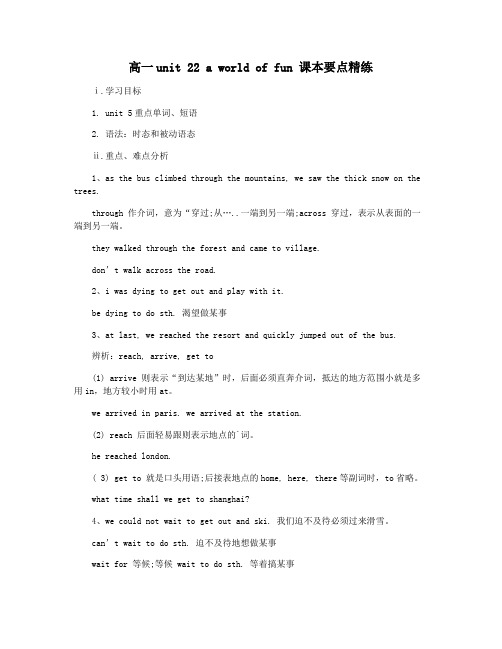
高一unit 22 a world of fun 课本要点精练ⅰ.学习目标1. unit 5重点单词、短语2. 语法:时态和被动语态ⅱ.重点、难点分析1、as the bus climbed through the mountains, we saw the thick snow on the trees.through 作介词,意为“穿过;从…..一端到另一端;across 穿过,表示从表面的一端到另一端。
they walked through the forest and came to village.don’t walk across the road.2、i was dying to get out and play with it.be dying to do sth. 渴望做某事3、at last, we reached the resort and quickly jumped out of the bus.辨析:reach, arrive, get to(1) arrive 则表示“到达某地”时,后面必须直奔介词,抵达的地方范围小就是多用in,地方较小时用at。
we arrived in paris. we arrived at the station.(2) reach 后面轻易跟则表示地点的`词。
he reached london.( 3) get to 就是口头用语;后接表地点的home, here, there等副词时,to省略。
what time shall we get to shanghai?4、we could not wait to get out and ski. 我们迫不及待必须过来滑雪。
can’t wait to do sth. 迫不及待地想做某事wait for 等候;等候 wait to do sth. 等着搞某事5、wearing skis for the first time made me feel strange. 第一次穿上滑雪板让我感觉怪怪的。
【教育学习文章】人教版高一(下)英语教案Unit 22 A World of fun
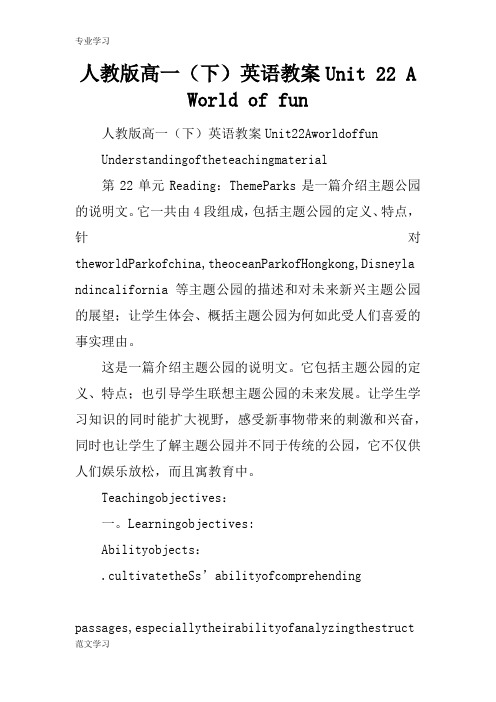
人教版高一(下)英语教案Unit 22 AWorld of fun人教版高一(下)英语教案Unit22AworldoffunUnderstandingoftheteachingmaterial第22单元Reading:ThemeParks是一篇介绍主题公园的说明文。
它一共由4段组成,包括主题公园的定义、特点,针对theworldParkofchina,theoceanParkofHongkong,Disneyla ndincalifornia等主题公园的描述和对未来新兴主题公园的展望;让学生体会、概括主题公园为何如此受人们喜爱的事实理由。
这是一篇介绍主题公园的说明文。
它包括主题公园的定义、特点;也引导学生联想主题公园的未来发展。
让学生学习知识的同时能扩大视野,感受新事物带来的刺激和兴奋,同时也让学生了解主题公园并不同于传统的公园,它不仅供人们娱乐放松,而且寓教育中。
Teachingobjectives:一。
Learningobjectives:Abilityobjects:.cultivatetheSs’abilityofcomprehending passages,especiallytheirabilityofanalyzingthestructureofsuchkindofarticles.2.offertheSschancesofself-culturebyworkingingroupsa ndseekinginformationaboutthemeparks.3.Enablethestudentstotellthemeparksfromtraditional amusementparksandgivethereasonswhythemeparksaresopo pular.knowledgeobjects:.HelptheSsfurtherunderstandthepassageandfinisht herelevanttaskscorrectly.AndenabletheSstolearn---in gformusedasadverbial.2.Learntheusagesofthefollowingwordsandphrases:base …on,incommon,divide,admire,risketc.3..AndhelptheSslearnhowtodesigntheirownthemeparks.二.Emotionalgoals:.通过这个单元的学习,知道人民的创造力的无限的,在以后的学习中充分发挥他的创造力。
高一英语下学期 Unit22 A world of fun词汇解析

高一下学期词汇解析Unit22 A world of funWords and expressionsamusement n. something that gives people fun or pleasure 文娱活动Big cities have theatres, films, basketball matches and many other amusements.大城市有戏剧、电影、篮球比赛以与许多其他的娱乐活动。
n. smiling and laughing娱乐;消遣His chief amusement is reading novels. 他的主要消遣是看小说。
coaster n. 惯性运动装置roller coaster n.[c] (游乐场等的) 云霄飞车(=switchback英)bungee [XbVndjI] n. 蹦极;跳簧;橡皮筋bungee jumping 蹦极跳free-fall ride 自由落体车乘creek n.小河;小溪souvenir n. something that one buys or gives because it will bring memories纪念礼物;纪念品He brought back a cowboy hat as a souvenir of America.他带回一顶牛仔帽作为访问美国的纪念。
giant n. a man of very great size and strength 巨人The great socialist China has towered like a giant in the East.伟大的社会主义中国像巨人一般屹立在东方。
adj. very big 巨大的There are two giant pandas in the zoo. 在动物园里有两只大熊猫。
dragon n. big, dangerous animal with fire in its mouth, whichlives only in stories龙attraction n. something that makes you want to come nearer, look at it, etc.吸引;吸力;吸引物The Tower of London is a great attraction to tourists. 伦敦塔对游客有很大的吸引力。
高一英语第一册 Unit 22 A world of fun人教版知识精讲

高一英语第一册Unit 22 A world of fun人教版【本讲教育信息】一、教学内容Unit 22 A world of fun〔一〕重点单词〔二〕重点短语〔三〕重点句型二、知识精讲〔一〕重点单词:1. The park is divided intotwo sections.这个公园分成两个局部。
句中divideinto 意思是“把……分成……〞;指把整体分成假设干局部;又如:→ Let’s divide our class into 7 groups.把咱们班分成7个小组吧。
divide 还常和among或between搭配,表示“在……之间进展平分〞如:→ He divided the cake among the children.他把这个蛋糕分给孩子们。
→ They divided the money between themselves.他们两个分了那笔钱。
divide 还可表示“〔数学〕除……,做除法〞,如:→ If you divide 30 by 6, the answer is 5.以6除30,答案为5.2. The parks are becoming more advanced and new technology allows us to experience almost anything without actually being in danger orrisking injury.主题公园越来越先进,新技术保障我们几乎能经历一切但又不必冒受伤害的风险。
risk “危险,风险,冒……的危〔风〕险〞;在本句中用作动词,后加名词injury作宾语。
又如:→ He risked his life to save the d rowning boy.他冒着生命危险去抢救那个落水的孩子。
→ She risked walking home alone at night.她冒险在夜里独自走回家。
高中英语 语法精讲(Unit 22 A world of fun)大纲人教版第一册
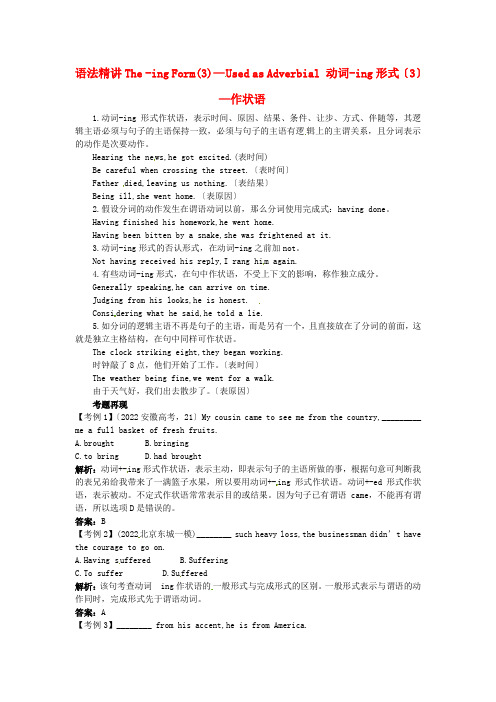
语法精讲The -ing Form(3)—Used as Adverbial 动词-ing形式〔3〕—作状语1.动词-ing形式作状语,表示时间、原因、结果、条件、让步、方式、伴随等,其逻辑主语必须与句子的主语保持一致,必须与句子的主语有逻辑上的主谓关系,且分词表示的动作是次要动作。
Hearing the ne ws,he got excited.(表时间)Be careful when crossing the street.〔表时间〕Father died,leaving us nothing.〔表结果〕Being ill,she went home.〔表原因〕2.假设分词的动作发生在谓语动词以前,那么分词使用完成式:having done。
Having finished his homework,he went home.Having been bitten by a snake,she was frightened at it.3.动词-ing形式的否认形式,在动词-ing之前加not。
Not having received his reply,I rang hi m again.4.有些动词-ing形式,在句中作状语,不受上下文的影响,称作独立成分。
Generally speaking,he can arrive on time.Judging from his looks,he is honest.Consi dering what he said,he told a lie.5.如分词的逻辑主语不再是句子的主语,而是另有一个,且直接放在了分词的前面,这就是独立主格结构,在句中同样可作状语。
The clock striking eight,they began working.时钟敲了8点,他们开始了工作。
〔表时间〕The weather being fine,we went for a walk.由于天气好,我们出去散步了。
高二英语 Unit 22 A world of fun

高二英语Unit 22 A world of fun●目标导引Ⅰ.单词及短语besides,risk,scream one's way to…,lead to,allow,divideⅡ.本单元语法分词作状语●内容精讲Ⅰ.单词及短语精讲1.experience n.&v.经验[u]; 经历[c]; 形容词为:experienced 有丰富经验的e.g.Don't correct him all the time-he'll learn by experience.别总纠正他的错误-他自己会通过经验学会的。
Our journey by came1 was quite an exper ience.骑骆驼旅行真是一次难忘的经历。
e.g.I experienced great difficulty in getting a visa to leave the country.申请出国签证经历了很大的困难。
e.g.She's very experienced at /in repairing cars.2.step v.(行)走;踩,踏n.脚步(声);步骤;台阶e.g.I stepped forward to receive the prize.我走上前去领奖。
I stepped in a puddle and got my foot wet. 我踩进了一个小水坑,把脚弄湿了。
e.g.Take 2 steps forward.向前跨两步。
Mind the steps outside the door.小心门外的台阶。
step 作为名词构成的短语有:step by step 逐渐地,一步一步地take steps (to do sth.)采取措施(做……)watch one's step 小心3.achievement n.完成,达到,成就,成绩动词为:achieve 完成,达到,获得e.g.He felt a great sense of achievement when he reached the top of themountain.当到达山顶的时候,他有一种巨大的成就感。
高一英语下册必修一知识点解析:A world of fun
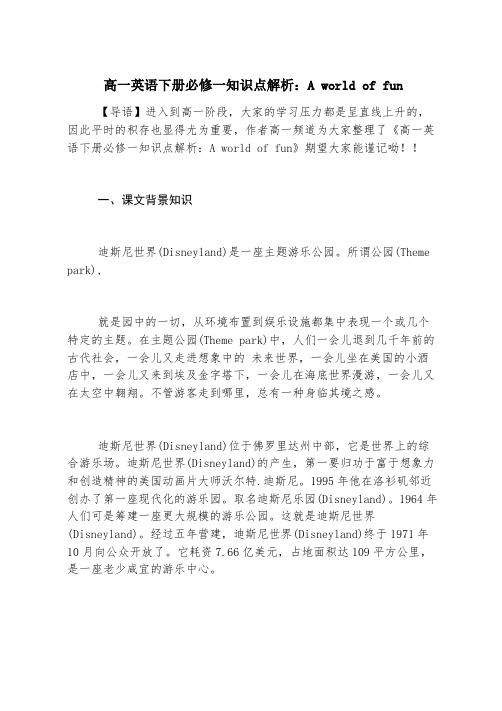
高一英语下册必修一知识点解析:A world of fun【导语】进入到高一阶段,大家的学习压力都是呈直线上升的,因此平时的积存也显得尤为重要,作者高一频道为大家整理了《高一英语下册必修一知识点解析:A world of fun》期望大家能谨记呦!!一、课文背景知识迪斯尼世界(Disneyland)是一座主题游乐公园。
所谓公园(Theme park),就是园中的一切,从环境布置到娱乐设施都集中表现一个或几个特定的主题。
在主题公园(Theme park)中,人们一会儿退到几千年前的古代社会,一会儿又走进想象中的未来世界,一会儿坐在美国的小酒店中,一会儿又来到埃及金字塔下,一会儿在海底世界漫游,一会儿又在太空中翱翔。
不管游客走到哪里,总有一种身临其境之感。
迪斯尼世界(Disneyland)位于佛罗里达州中部,它是世界上的综合游乐场。
迪斯尼世界(Disneyland)的产生,第一要归功于富于想象力和创造精神的美国动画片大师沃尔特.迪斯尼。
1995年他在洛衫矶邻近创办了第一座现代化的游乐园。
取名迪斯尼乐园(Disneyland)。
1964年人们可是筹建一座更大规模的游乐公园。
这就是迪斯尼世界(Disneyland)。
经过五年营建,迪斯尼世界(Disneyland)终于1971年10月向公众开放了。
它耗资7.66亿美元,占地面积达109平方公里,是一座老少咸宜的游乐中心。
在迪斯尼世界(Disneyland)中,没有中央大街、小世界、海底两万里、明天的世界、拓荒之地和自由广场等。
中央大街上有高雅的老式马车、古色古香的店铺和餐厅茶室等;小世界是专给孩子们设计、为他们所向往的娱乐天地;在“海底两万里”,人们可坐上特制的潜艇,时而来到一片升级勃勃的热带海床,时而又来到阴森寂寥的寒带海床,纵情观赏五花八门的海底植物和水族,乃至还能看到满载珠宝货物的沉船和因地震陷落海底的古代城市;在“明天的世界”里,人们将置身于一个高度发达的环境中,并可亲身到“月球”上去游玩一番;如果来到拓荒之地和自由广场,那就另是一个天地了,在这里人们可以重温当年各国移民在新大陆拓荒的种种情形,和英国殖民时期美州大陆的状态。
- 1、下载文档前请自行甄别文档内容的完整性,平台不提供额外的编辑、内容补充、找答案等附加服务。
- 2、"仅部分预览"的文档,不可在线预览部分如存在完整性等问题,可反馈申请退款(可完整预览的文档不适用该条件!)。
- 3、如文档侵犯您的权益,请联系客服反馈,我们会尽快为您处理(人工客服工作时间:9:00-18:30)。
课堂加油站Eng lish Journal 单元笔记贵州省六盘水市六枝特区一中宋永会UnitA w orld of f u n要点解读22一、词语例解1.minority n.少数(尤指投票中之较少部分);少数民族Only a mino rity of the class v oted for the plan.班里只有少数学生投票赞成这项计划。
We w ere in the minority.我们属于较少数的一方。
The Chinese natio n includes mo re than50national minorities besides the Hans.中华民族除汉族外,还有50多个少数民族。
2.risk n.危险;风险The inv estment is free fro m risk.这项投资没有风险。
They took a risk in driving on,notw ith-standing the storm.尽管有暴风雨,他们还是冒险驾车赶路。
vt.冒着……的危险,后接名词或动词的-ing 形式作宾语。
The brav e man risked his life in trying tosave the child.那个勇士冒着生命危险去救那个男孩。
If y ou g o out w ithout a raincoat yo u w ill risk getting w et,because it may rain.如果你不带雨衣出去,你就要冒被淋湿的危险,因为可能下雨。
He risked being caught and killed.他冒着被捕捉和杀死的危险。
【搭配】at o ne ’s o wn risk 自担风险/at risk 在危险中/at the risk o f 冒……危险;不顾……风险/run (take )a risk (s )冒险/take no risks 慎重行事/take the risk (of)do ing sth 冒险做某事/at all risks (=atany risk)表示无论如何;无论冒什么危险3.divide vt.1)分,划分,分开He div ides his time between w ork andplay .他分配他的工作和游玩的时间。
I div ide the cake into four parts.我把蛋糕分成四份。
2)除(尽)Nine div ided by three is three.九除三等于三。
If yo u div ide 20by 4,the answer is 5.如果你把二十除以四,那么商是五。
How much is tw enty div ided by tw o?二十被二除得多少?【辨析】divide ,separatedivide 指的是把一个整体或集体分成若干等份,其后接into ,w ith ,amo ng (betw een)等。
separate 指把原来连在一起或靠近的“分隔”开来,使其不在一起,常与介词fro m 连用。
He divided the cake among the children.他把这个饼子分给孩子们。
We div ided the money equally .我们平分这钱。
The Taiw an Straits separates Taiwan from Fujian.台湾海峡把台湾和福建隔开了。
The bo ys were f ighting,but the teacher separated them.男孩子正在打架,老师把他们拉开了。
另外separate 还可指“分别;离别”。
例如:We w ent to the bank tog ether ,then said go od-by e and separated.我们一起去银行,然后彼此告别分手。
4.injury n.1)(指身体)引起痛苦之事物、伤口He fell o ff the ladder and had serious in-juries.他从梯子上摔下来受了重伤。
His injuries w ere bad,so he w ent tohos-8pital.他受伤很重,所以去医院了。
Smoking is an injury to health.吸烟对身体有害。
2)(精神上的)伤害;损人的事M ost people protect themselv es from in-jury to their self-esteem.大多数人保护自己使自尊心不受伤害。
【辨析】wo und,hurt,injuryinjury指平常的大小创伤或伤害;hurt 尤指精神和感情上的伤害,肉体的伤痛;w ound一般指外伤,多指枪或锐器所造成的创伤,尤指在战争中受的伤。
He got serious injuries to the leg s at w ork.他干活时腿受了重伤。
The soldier receiv ed two w ounds in the battle.这位士兵在战斗中两处受伤。
The hurt to his feelings is more serio us than the hurt in his body.他在感情上受到的伤害比身体上的伤痛更严重。
5.prev ent v.阻止;制止;避免Rain prevented the base-ball game.下雨使棒球比赛无法进行。
We should do our best to prevent acci-dents.我们应该尽力防止事故发生。
Their prompt actio ns prevented the f ire from spreading.他们敏捷的行动阻止了火势蔓延。
【拓展】在prevent/stop sb.(sth.)from doing sth.结构中fro m在主动句中可省略。
keep sb.(sth.)fro m do ing sth.其中from不能省略,例如:No thing w ill prev ent us(fro m)reaching o ur aims.什么也阻止不了我们达到我们的目的。
(可省略from)I w as prevented by illness f rom taking the exam.我因病未能参加考试。
(不可省略from)What can stop me(fro m)go ing if I w ant to go?如果我要去,有什么能阻止我呢? (from可省去)The heavy rain kept us fro m g oing out.大雨使我们无法出去。
(from不可省去)二、短语精析bine A with/and B使……与……结合;使……与……混合成一体The tw o old scho ols are to co mbine to form one big new school.这两所旧学校将合并组成一所新的大学校。
Co mbine the eggs with a little flour and heat the mix ture g ently.把鸡蛋和少量面粉调匀,用文火加热。
We can’t alw ays combine w ork w ith pleasure.我们并不总是能在工作中享受到乐趣。
2.cut off切断;隔绝While I w as talking to him on the tele-phone,w e were cut off.我和他通话时,线路被切断了。
When w e were aw ay o n our ho lidays,the men came and cut o ff the w ater and the gas.我们去度假时,来人断了我家的水和煤气。
【拓展】cut do wn砍倒;减少cut in插话cut up切碎;齐根切掉cut out删除;停止cut thro ug h抄近路三、句式点睛1.Wa lk pa st the Big Tower Fr ee-fall Ride and the r oller coaster will be on your left.本句的结构为“祈使句+and+陈述句”,这是一个条件与结果并存的并列句,其中祈使句表示条件,and表示条件与结果并存。
陈述句表示结果,祈使句相当于if引导的条件状语从句,陈述句多用一般将来时。
例如: Wo rk hard and y ou’ll succeed.努力学习你就会成功的。
=If you w ork hard,you’ll succeed.Use your head and yo u’ll find a w ay.动动脑筋,你就会想出办法的。
=If you use your head,y ou’ll find a w ay.另外“祈使句+o r+陈述句”也是一个条件与结果并存的并列句,其中祈使句表示条件,相当于if引导的表示否定意义的条件状语从句,or是并列连词,陈述句表示结果,谓语通常用一般将来时。
例如:Hurry up,o r you will be late for scho ol. =If you don’t hurry up,you w ill be late for school.赶快,否则你上学就会迟到了。
2.What they all have in common is◎F'y阮梦湖北省武昌实验中学高一(5)班a i lure d oe s n t me an ou s hou d g i ve up.9that they combine fun with the oppor tuni-ty to lea rn something.它们的共同之处是将娱乐和学习的机会结合在一起了。
What引导的名词性从句What they all hav e in commo n在句中作主语,that引导的从句that they combine fun w ith the o ppo rtu-nity to learn so mething在句中作表语。
that 在引导名词性从句时,不在从句中作成分,不含疑问意义也没有实际意义,只起连结作用,在句首时不可省略。
What在引导名词性从句时既起连结作用,又要在从句中作主语或宾语,在任何情况下它都不能省略,它有具体意义,表示“什么,所……的(事、物、话)”。
例如:What surprises me mo st is that she doesn’t even know where the dif ference be-tw een the tw o lies.使我感到最吃惊的事情是,她甚至还不知道这二者的区别在哪里。
